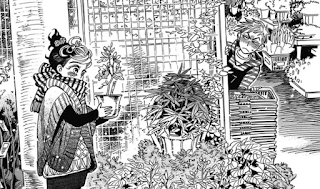week thirteen: the fall of hetalia
This week we talked about Hetalia and comedy in anime. I will use this blog post to talk about the fall of Hetalia in popular culture and the many flawed aspects of it, from its use of racial stereotypes to its fetishization of WWII.
Now, Hetalia isn't the first anime to use WWII as either an implied inspiration or the exact setting (such as Grave of the Fireflies and Joker Game), but it is probably the worst anime to do it. I've never been particularly engaged in Hetalia, though I knew a few people in middle school who were fans of it. This seems to be the case for most people: they enjoyed the lighthearted, ridiculous humor as kids, but then grew out of it as they became adults and gained higher standards for themselves and the mediums they enjoyed.
A big, jarring red flag for me was its usage of Axis Powers in the title. I never really paid attention to it, and during class it was pretty much the first time I realized how horrible it was. It was called Axis Powers. I... really hate when WWII gets fetishized, whether intentional or by mistake. Well, if it's a mistake, they could at least apologize for it. It actually does have real-world consequences. If you look at how the alt-right is NOW, they use this confabulated, inaccurate idea that "rebellion is sexy, so if you're a white supremacist you're rebelling against society, so you're sexy and cool". That's how they get more followers, by being trolls and using memes and seeming "funny and cool" to other people, most likely children or young adults, to join their cause.
I could say a lot about why racial stereotypes are harmful, especially if they're in a popular medium, especially if they're watched by impressionable young children in the pre-teen to teenage age group. I'll just say that the jokes are uninspired and boring, told with no creative energy expended. The phrase "political satire" was thrown around in the class discussion. This could be a relatively controversial concept in relation to humor and free speech, but political satire can only be classified as such when it "punches up". Punching above your weight class, using humor to call attention to the corruption of those in power. This is why when John Oliver or Hasan Minhaj or Samatha Bee make jokes about politicians, it's political satire. Political satire is not when Donald Trump makes jokes about immigrants, or uses Jewish imagery to paint his political opponents in a negative light.
The concept of one character embodying a whole country is ridiculous. It's impossible. If I had to create a character based off of China or America, I couldn't. China would be many things, multi-faceted. A farmer stooped over, darkly tanned, riding his bike every morning to the market to buy cold treats for his family in the sweltering heat. A grandma with broken teeth and brittle feet and always with food on the table no matter how much you'd eat. A young woman with Gucci sunglasses and Hermes handbags, making enough money to bring her parents from the countryside into the city. A boy from a nouveau riche family who's never known anything but wealth and privilege.
I know for a fact how fun it is, when you're among your peers of a minority group, to joke about stereotypes. It's fun! It's something relatable! It's not great when that's stuffed into a TV show, mashed together with genuinely stupid jokes, and given to people outside of your culture to consume, because there's no control you have over it.
I could say a lot about why racial stereotypes are harmful, especially if they're in a popular medium, especially if they're watched by impressionable young children in the pre-teen to teenage age group. I'll just say that the jokes are uninspired and boring, told with no creative energy expended. The phrase "political satire" was thrown around in the class discussion. This could be a relatively controversial concept in relation to humor and free speech, but political satire can only be classified as such when it "punches up". Punching above your weight class, using humor to call attention to the corruption of those in power. This is why when John Oliver or Hasan Minhaj or Samatha Bee make jokes about politicians, it's political satire. Political satire is not when Donald Trump makes jokes about immigrants, or uses Jewish imagery to paint his political opponents in a negative light.
The concept of one character embodying a whole country is ridiculous. It's impossible. If I had to create a character based off of China or America, I couldn't. China would be many things, multi-faceted. A farmer stooped over, darkly tanned, riding his bike every morning to the market to buy cold treats for his family in the sweltering heat. A grandma with broken teeth and brittle feet and always with food on the table no matter how much you'd eat. A young woman with Gucci sunglasses and Hermes handbags, making enough money to bring her parents from the countryside into the city. A boy from a nouveau riche family who's never known anything but wealth and privilege.
I know for a fact how fun it is, when you're among your peers of a minority group, to joke about stereotypes. It's fun! It's something relatable! It's not great when that's stuffed into a TV show, mashed together with genuinely stupid jokes, and given to people outside of your culture to consume, because there's no control you have over it.

Comments
Post a Comment